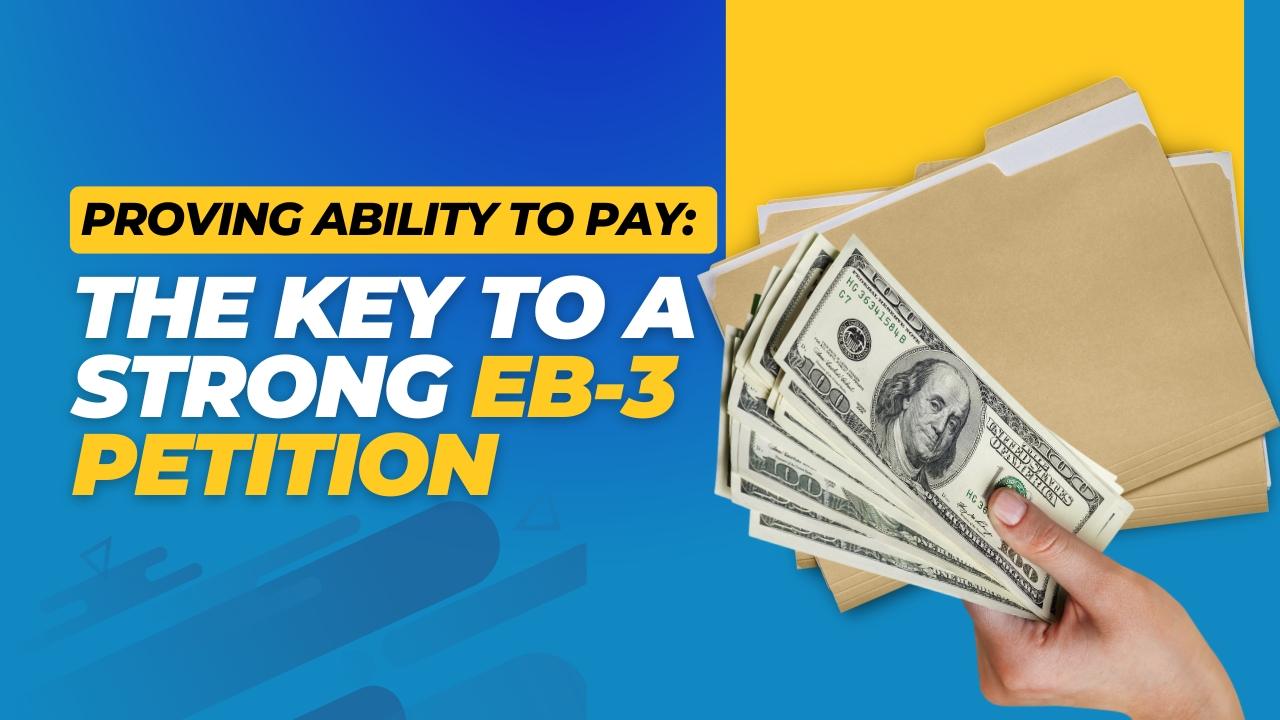Imagine this, ABC LLC wants to sponsor a foreign worker, Mr. John, for an EB-3 green card. The company offers him an annual salary of $60,000 in its PERM application which was determined in the PWD. But a quick look at the company’s financials reveals a problem, ABC LLC is operating at a loss, with negative net income and net current assets. Will USCIS approve the I-140 petition in this scenario?
This is a common dilemma for many employers, especially small businesses and startups. The good news is that a company’s financial struggles don’t automatically doom a green card petition. Let’s break down the “ability to pay” requirement and explore some strategies for proving your company’s financial capability.
What is the EB-3 Visa?
The EB-3 is an employment-based, third preference immigrant visa category. It allows U.S. employers to sponsor foreign nationals for lawful permanent residency. Unlike temporary work visas, the EB-3 leads directly to a green card, granting the foreign worker the right to live and work in the United States on a permanent basis.
What Does “Ability to Pay” Mean in EB-3?
When an employer files an I-140 Immigrant Petition for Alien Worker under the EB-3 category, USCIS requires evidence that the employer has the financial ability to pay the offered wage. This obligation begins from the priority date (the date the PERM application was filed) and continues until the foreign worker becomes a permanent resident.
Under 8 C.F.R. § 204.5(g)(2), an employer can demonstrate ability to pay through:
- Net income (showing sufficient profit on tax returns)
- Net current assets (demonstrating liquid assets to cover the wage)
- Actual wages already being paid to the employee
- A financial officer’s statement, if the company employs 100 or more workers
The company’s net income or net current assets must be equal to or greater than the offered wage. If the company is already paying the wage to the employee, that’s often the simplest way to prove ability to pay.
A special consideration exists for large employers. If a company has 100 or more employees, they can submit a statement from a financial officer to prove their ability to pay, which can be a lifeline if other metrics are not favorable.
Common Challenges Employers Face
Many employers, especially those in their early stages, face this issue. Seasonal businesses, newly established companies, or employers with fluctuating income often find it difficult to meet this requirement. In our opening example, since ABC LLC shows both negative net income and assets, the I-140 petition would likely face denial without additional support.
However, a denial is not a foregone conclusion. While USCIS prefers to see strong financial numbers, there are other ways to demonstrate a company’s financial health.
Alternative Ways to Demonstrate Ability to Pay
Even if your company’s tax returns show a loss, you can still present a compelling case to USCIS by considering the totality of the circumstances. Here are some key strategies to consider:
Prove You’re a Viable, Ongoing Business
A company’s financial statements only tell part of the story. You can supplement your petition with documentation that shows the company has been operating for several years, continues to generate revenue, and actively maintains its employees and business activities. This demonstrates stability and a long-term commitment to meeting obligations, even if net income fluctuates.
Showcase Future Revenue and Growth
While USCIS won’t approve a petition based on financial projections alone, you can strengthen your case with evidence of future income. This might include:
Signed contracts or service agreements that guarantee future revenue
Purchase orders from clients
Proof of funding rounds for startups
This helps establish that the business is on a path toward financial stability and is capable of meeting its long-term obligations.
Leverage the Totality of the Circumstances
Under legal precedents like Matter of Sonegawa, USCIS is required to look at the overall financial health and reputation of the company, not just one year’s numbers. For example, a temporary loss might not prevent an approval if the company has a strong history, a solid reputation, and consistent operations with ongoing contracts and employees. This holistic approach can be particularly valuable for long-established companies that face temporary downturns but remain financially sound.
Final Thoughts
While a company’s negative financials can pose a significant challenge in an EB-3 petition, they don’t have to be a deal-breaker. By gathering comprehensive evidence that demonstrates your company’s continued business operations, future growth potential, and overall financial health, you can present a strong case to USCIS.

